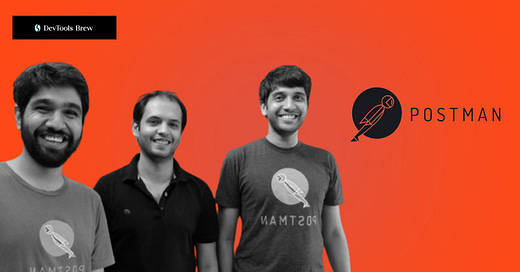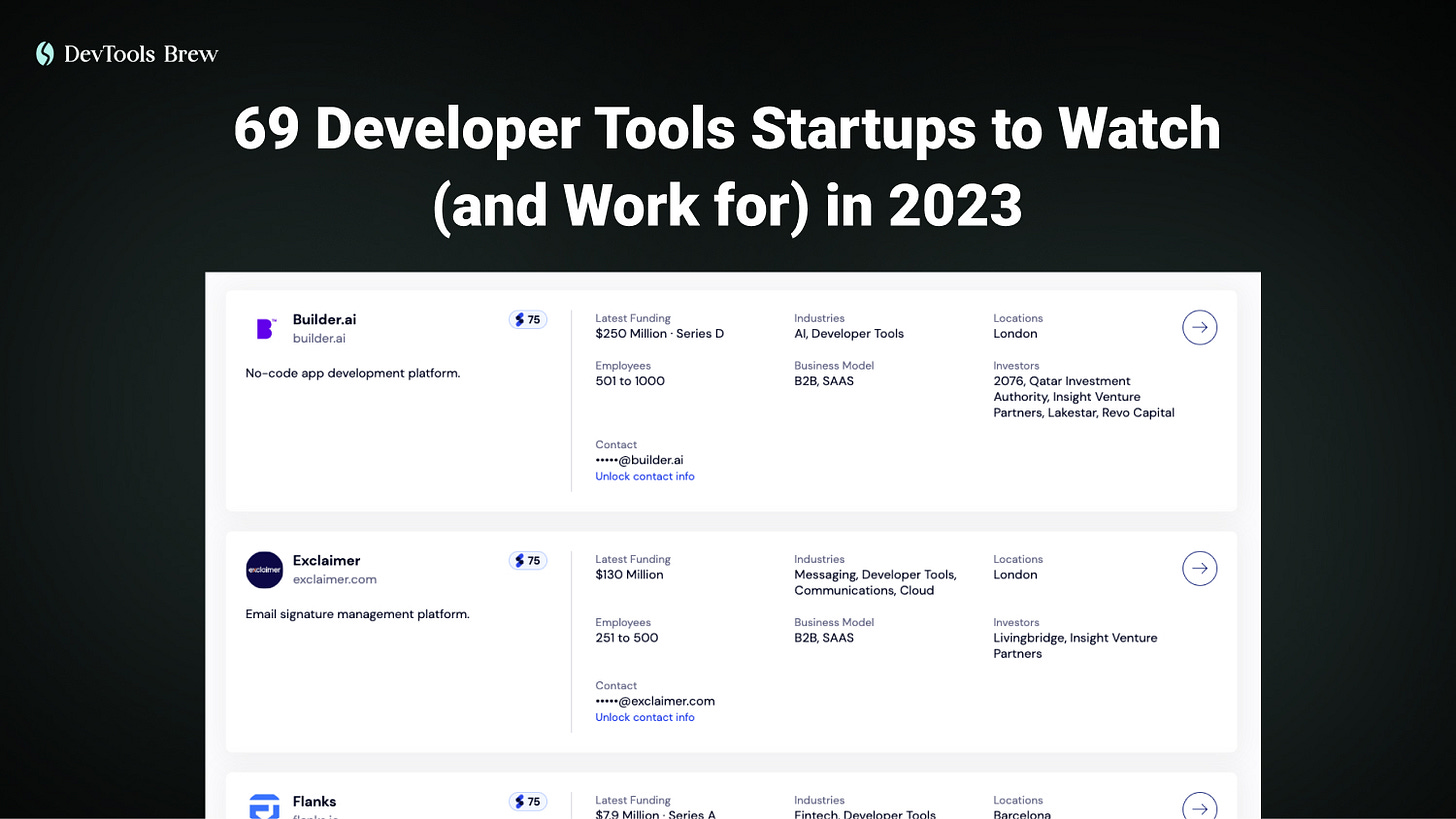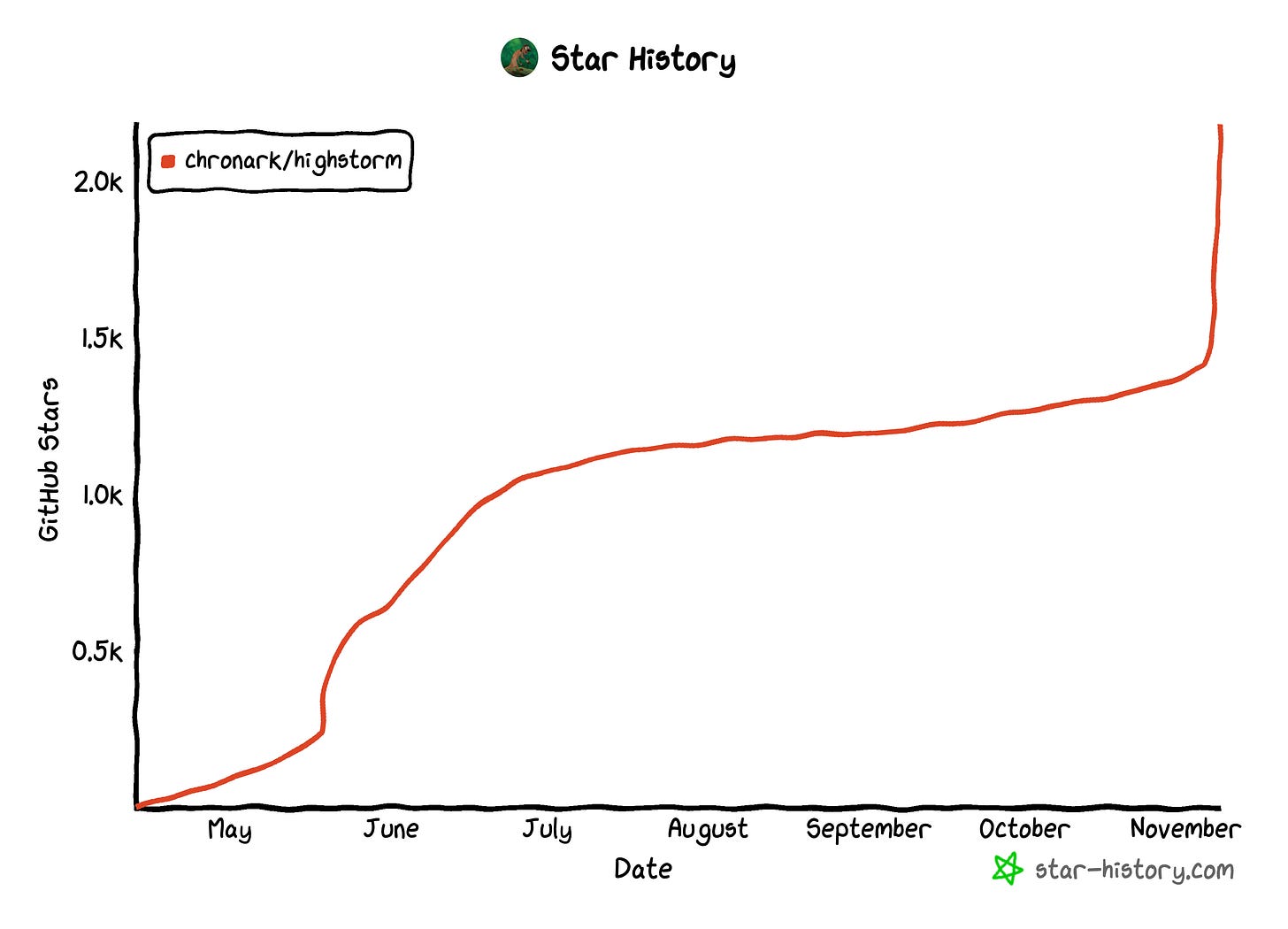DevTools Brew #36: Postman Story: From Side Project to Billion-Dollar Company, 69 Developer Tools Startups to Watch (and Work for) in 2023...
Hey folks, welcome to DevTools Brew #36!
If you're new here, my name is Morgan Perry, co-founder of Qovery, and every Saturday, I share the stories, strategies, and insights behind the most successful devtool companies.
In this Issue #36:
📈 Postman Story: From Side Project to Billion-Dollar Company
💻 69 Developer Tools Startups to Watch (and Work for) in 2023
⭐ Star History Weekly Pick
💰 Devtools Funding Rounds of The Week
I hope you will enjoy this new edition.
Let's dive in!
📈 Postman Story: From Side Project to Billion-Dollar Company
Postman, a company that simplifies the management of APIs for developers, has emerged as the fastest Indian SaaS company to reach unicorn status. Founded by Abhinav Asthana, Ankit Sobti, and Abhijit Kane, Postman's journey began as a humble side project with unexpected twists that propelled it to unicorn status. Let's unravel the intriguing story👇
Key Insights:
From Basti to the Bay Area
Abhinav Asthana's journey began in Basti, a small town in eastern Uttar Pradesh, India.
He first encountered a computer, a Pentium I PC, as a Class 5 student, igniting his passion for technology.
Abhinav's father, who taught him programming, played a crucial role in nurturing his tech skills.
He earned his first income as a teenager through website design, foreshadowing his entrepreneurial spirit.
Early Entrepreneurship
Abhinav's experiences in small towns across Uttar Pradesh laid the foundation for his entrepreneurial mindset.
He attempted to build a Yahoo clone and provided website design services, receiving his first paycheck in dollars.
These early experiences demonstrated Abhinav's natural inclination towards entrepreneurship.
The Birth of Postman
Postman started as a side project in 2012, evolving into a full-fledged SaaS startup.
Formal founding occurred in 2014, marking the birth of Postman as we know it today.
TeliportMe, their earlier venture, introduced them to the complexities of managing APIs.
They encountered issues like cumbersome API testing processes and the need to start from scratch after updates.
API testing evaluates application interfaces based on functionality, reliability, performance, and security.
Frustrated with the lack of solutions, they decided to create their own APIs.
This demonstrated their entrepreneurial spirit, problem-solving drive, and tech-savvy skills.
A Fun Side Project Becomes a Solution
They uploaded their API codes to the Chrome Web Store.
What began as a side project quickly became a solution with over 500,000 users.
This success highlights the power of organic growth, user-driven innovation, and recognizing unmet needs.
Recognition and Growth
In 2014, Postman received its first funding and transitioned into a Series A-funded startup.
Noteworthy clients like Netflix, Cisco, Microsoft, Sony, and PayPal recognized the value of Postman's solution.
Data-driven decision-making became a hallmark of Postman, influencing product development and major choices like fundraising and expansion.
Utilizing data for both product development and strategic decisions reflects their commitment to informed growth.
Maintaining simplicity and a streamlined framework ensured continuous growth without complex overhauls.
This underscores the importance of simplicity and adaptability in scaling a tech venture.
An Investor Magnet
Postman's unique value proposition attracted investors without the need for traditional pitch decks.
In 2016, the startup secured $1 million in seed funding from Nexus Venture Partners, and in 2017, it raised $7 million in its Series A round from the same investor.
Postman's impressive funding journey, totaling $433 million over five rounds, featured investments from leading names like Insight Partners, Coatue, Battery Ventures, BOND, and Nexus Ventures.
Attracting significant investments from renowned venture capital firms and investors indicates their strong value proposition.
The Unicorn Milestone
A pivotal moment came in 2020 with a Series C round led by Insight Partners, raising $150 million and valuing Postman at $2 billion.
Postman claimed the title of the fastest Indian SaaS company to reach unicorn status.
This achievement is a testament to their rapid growth and market impact.
Today, headquartered in the San Francisco Bay Area, Postman's services reach over 17 million developers and 500,000 companies globally, establishing itself as the world's largest API community.
A Resilient Workforce
Postman's growth continued even during the challenging times of the COVID-19 pandemic.
While many companies faced layoffs and salary cuts, Postman maintained its commitment to hiring and expanding.
They efficiently transitioned to remote hiring practices and are planning to double their headcount in the Bengaluru office.
The company foresees growth across all departments, including product and design, engineering, sales, and marketing.
Success Ingredients:
Postman's success is underpinned by several key factors:
Identifying a pressing need for API management solutions and a widespread problem in the developer community.
Recognizing a market gap and seizing the opportunity.
Innovation, creating a comprehensive API ecosystem from design to documentation.
Attracting an impressive user base through a user-friendly product.
Leveraging data-driven approaches for development and strategic decisions.
A commitment to simplicity and a streamlined framework.
Openness and Community
Postman has maintained transparency throughout its journey, with its bug tracker and feature lists publicly accessible.
Constant interaction with its user base and a commitment to listening to developers' needs have set Postman apart.
Putting India on the Map
Abhinav Asthana's initial vision was to establish a significant tech company that could compete with Silicon Valley giants.
While the company's headquarters is now in San Francisco, they've retained a strong presence in Bengaluru.
This move aimed to demonstrate that world-class technology products could be built in India and be recognized globally.
This remarkable journey of a fun side project morphing into a unicorn enterprise underscores the power of innovation, resilience, and a keen focus on solving real-world challenges. It's a testament to how passion, persistence, and astute decision-making can lead a startup to become a global tech leader.
💻 69 Developer Tools Startups to Watch (and Work for) in 2023
Developer Tools is rapidly transforming the way we think about and interact with the world around us. This year, Devtool startups have successfully secured $580M in investments. SeedTable shared a list of leading Developer Tools startups for 2023. The list kicks off with companies like Sendinblue, AutogenAI, and Apica, but all startups are worth diving into.
👉 https://www.seedtable.com/startups-developer-tools
Important Note: This list is sourced from SeedTable and does not represent the entire Devtools ecosystem comprehensively. Additionally, it predominantly features European startups as SeedTable focuses on this region. Occasionally, some of these startups may not neatly fit within the Devtools category, in my view. Nevertheless, I believe it offers valuable insights, and that's why I'm sharing it with you.
⭐ Star History Weekly Pick
The Star History Weekly Pick is:
Highstorm: “Open Source Event Monitoring.”
⭐️ 2.4k stars reached
💰 Devtools Funding Rounds of The Week
Lunar.dev, the first-ever API Consumption Management solution, announced today the launch of its open-source platform, along with $6M in Seed funding.
Tabnine, a code-generating AI platform, raised $25M in a Series B funding.
Cast AI, which helps companies optimize cloud spend, raised $35M in a Series B funding.
Cloudprinter, a print-on-demand platform utilizing advanced APIs and cloud technology, raised an undisclosed amount in funding.
It’s already over! If you have any comments or feedback, you can reach out to me on LinkedIn or Twitter.
Thanks for reading,
Morgan
There are no ads in my newsletter. All I ask is you subscribe, share, and enjoy! :)






